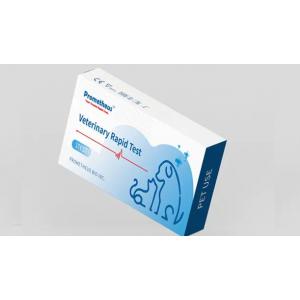Supplier: Prometheus Bio Inc.
Contact person: Ms. prometheusbio
Position:
Address: 2nd floor, No. 3, 8th Street, Qiantang Area, 310018 Hangzhou, Zhejiang, China
Country: China
Phone: - Mobi: 0571-86908151
Veterinary Rapid Test Kits
Price:
Veterinary diagnostic tests are medical devices used to diagnose and monitor animal health conditions. Veterinary test kits play a critical role in the early detection and prevention of animal diseases and infections, allowing you pay a better attention to Pet Health. Prometheusbio is a professional veterinary rapid test kits supplier, providing veterinary rapid test kits with competitive pricing.
Veterinary diagnostic tests are laboratory tests used to diagnose diseases in animals. These pet health test use a variety of methods, such as blood tests, urine tests, swabs, tissue samples, and imaging to evaluate the animal's health. Veterinary diagnostic tests are essential in detecting and identifying diseases affecting both domestic and wild animals. They help in the identification and treatment of diseases, monitoring the progression of a disease, and assessing the effectiveness of therapy. Common veterinary diagnostic tests include Complete Blood Count (CBC), serum biochemistry, fecal tests, imaging tests, and tests for diseases such as heartworm, feline leukemia virus, and rabies. Veterinary diagnostic tests are critical in animal health care and public health.
Veterinary Diagnostic Tests Faqs
Q.
Why Are Veterinary Diagnostic Tests Important?
A.
Veterinary diagnostic tests are important because they help veterinarians diagnose and treat illnesses and health conditions in animals. They are also critical in monitoring the progression of diseases, assessing the efficacy of therapies, and preventing and controlling outbreaks of infectious diseases.
Q.
How Are Veterinary Diagnostic Tests Performed?
A.
The type of test required will depend on the animal's symptoms, history, and physical exam. The most common diagnostic tests include drawing a small amount of blood, collecting a urine sample, taking radiographs, and collecting fecal samples.
Q.
Are Veterinary Diagnostic Tests Painful For Animals?
A.
Most veterinary diagnostic tests are minimally invasive and generally not painful. Some tests, such as blood draws and injections, may cause mild discomfort or pain but are usually well-tolerated by animals.
Q.
How Long Do Veterinary Diagnostic Tests Take?
A.
The time it takes to receive results depends on the type of diagnostic test being conducted. A fecal or blood test may take a few hours, while more complex tests such as biopsies or cultures may take several days or weeks.
Q.
Who Interprets The Results Of Veterinary Diagnostic Tests?
A.
Veterinarians are trained to interpret the results of veterinary diagnostic tests and will explain them to you. Treatment recommendations will be made according to these results.
There are many point of care testing manufacturers, but we are one of the best choices for you.
Veterinary diagnostic tests are laboratory tests used to diagnose diseases in animals. These pet health test use a variety of methods, such as blood tests, urine tests, swabs, tissue samples, and imaging to evaluate the animal's health. Veterinary diagnostic tests are essential in detecting and identifying diseases affecting both domestic and wild animals. They help in the identification and treatment of diseases, monitoring the progression of a disease, and assessing the effectiveness of therapy. Common veterinary diagnostic tests include Complete Blood Count (CBC), serum biochemistry, fecal tests, imaging tests, and tests for diseases such as heartworm, feline leukemia virus, and rabies. Veterinary diagnostic tests are critical in animal health care and public health.
Veterinary Diagnostic Tests Faqs
Q.
Why Are Veterinary Diagnostic Tests Important?
A.
Veterinary diagnostic tests are important because they help veterinarians diagnose and treat illnesses and health conditions in animals. They are also critical in monitoring the progression of diseases, assessing the efficacy of therapies, and preventing and controlling outbreaks of infectious diseases.
Q.
How Are Veterinary Diagnostic Tests Performed?
A.
The type of test required will depend on the animal's symptoms, history, and physical exam. The most common diagnostic tests include drawing a small amount of blood, collecting a urine sample, taking radiographs, and collecting fecal samples.
Q.
Are Veterinary Diagnostic Tests Painful For Animals?
A.
Most veterinary diagnostic tests are minimally invasive and generally not painful. Some tests, such as blood draws and injections, may cause mild discomfort or pain but are usually well-tolerated by animals.
Q.
How Long Do Veterinary Diagnostic Tests Take?
A.
The time it takes to receive results depends on the type of diagnostic test being conducted. A fecal or blood test may take a few hours, while more complex tests such as biopsies or cultures may take several days or weeks.
Q.
Who Interprets The Results Of Veterinary Diagnostic Tests?
A.
Veterinarians are trained to interpret the results of veterinary diagnostic tests and will explain them to you. Treatment recommendations will be made according to these results.
There are many point of care testing manufacturers, but we are one of the best choices for you.
SEND INQUIRY
Please fill in fully your information to send email
CATEGORY














 Agriculture
Agriculture